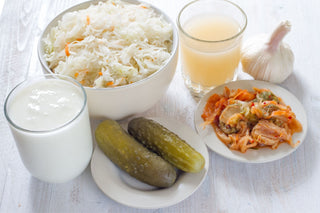
What are pre- and probiotics?
Pre- and probiotics are microorganisms that are beneficial to the human body. Prebiotics are non-digestible food components that serve as food for good bacteria in the gut. Probiotics, on the other hand, are living microorganisms that are introduced directly into the intestine to improve the intestinal flora and promote the growth of healthy bacteria.
Why are pre- and probiotics important?
Pre- and probiotics are important as they have a significant impact on our health. Our gut flora, which consists of a variety of microorganisms, plays a crucial role in digestion, the immune system and general well-being. An unhealthy gut flora can lead to a number of health problems, while a healthy gut flora offers many benefits. Pre- and probiotics can help maintain or restore the gut flora in a healthy state.
prebiotics
What are prebiotics?
Prebiotics are non-digestible food components that act as food for good bacteria in the gut. They are not digested by our body, but reach the large intestine unchanged, where they are metabolized by the good bacteria.
How do prebiotics work in the body?
Prebiotics encourage the growth of healthy bacteria in the gut by serving as food for them. They help to improve the intestinal flora and can have many positive effects on our health.
Which foods contain prebiotics?
Prebiotics are found in a number of foods, including bananas, garlic, onions, artichokes, kale, and oatmeal.
probiotics
What are probiotics?
Probiotics are live microorganisms that are injected directly into the gut to improve gut flora and encourage the growth of healthy bacteria.
How do probiotics work in the body?
Probiotics work by promoting the growth of healthy bacteria in the gut and inhibiting the growth of unhealthy bacteria. They help to improve the intestinal flora and can have many positive effects on our health.
What types of probiotics are there?
There are a variety of probiotics, including Lactobacillus and Bifidobacterium. Each type of probiotic has a specific effect in the body and is suitable for specific health problems. It is important to choose the right probiotic for your needs.
Which foods contain probiotics?
Probiotics can be found in a number of foods, including yogurt, kefir, sauerkraut, kimchi, and kombucha. It is also possible to consume probiotics in the form of dietary supplements.

A comparison of prebiotics and probiotics
Differences and similarities
Prebiotics and probiotics differ in their function in the body. Prebiotics serve as food for good bacteria, while probiotics are delivered directly to the gut to encourage the growth of healthy bacteria. However, both can help improve gut flora and have positive health effects.
When to use prebiotics and when to use probiotics?
It depends on what health problem you want to fight. If you want to encourage the growth of healthy bacteria in your gut, you can consider prebiotics. However, if you want to combat certain health problems, such as antibiotic-associated diarrhea, it may make more sense to consume probiotics. It is important to seek advice from a doctor or nutritionist to make the best choice for your needs. c
Health benefits of pre- and probiotics
improve digestion
Pre- and probiotics can improve digestion by promoting the growth of healthy bacteria in the gut. This can lead to improved digestion and fewer indigestion.
Strengthening of the immune system
A healthy intestinal flora is important for a strong immune system. Prebiotics and probiotics can help to improve the intestinal flora and thus strengthen the immune system.
Improvement of the intestinal flora
Pre- and probiotics can help improve gut flora by promoting the growth of healthy bacteria and inhibiting the growth of unhealthy bacteria. A healthy intestinal flora is important for general well-being and can have many positive health effects.
reducing inflammation
Pre- and probiotics can reduce inflammation in the body by promoting the growth of healthy bacteria and inhibiting the growth of unhealthy bacteria. This can be particularly beneficial for people with chronic inflammatory diseases such as rheumatism or ulcerative colitis.
Improving general well-being
Pre- and probiotics can help improve overall well-being by improving gut flora and reducing inflammation. A healthy gut flora is also important for good emotional well-being as the gut is closely connected to the brain.
Pre- and probiotics for certain health problems
Antibiotic-associated symptoms
Antibiotics can affect the intestinal flora, which can lead to antibiotic-associated diarrhea. Probiotics can help restore gut flora and thus prevent or treat antibiotic-associated diarrhea.
irritable bowel syndrome
Irritable bowel syndrome is a condition that can cause indigestion, pain, and bloating. Pre- and probiotics can help relieve IBS symptoms by improving gut flora.
histamine intolerance
In histamine intolerance, the body is overly sensitive to histamine, a chemical found in many foods. Probiotics can help alleviate the symptoms of histamine intolerance by promoting the growth of healthy bacteria and inhibiting the growth of unhealthy bacteria.
acne
An unhealthy gut flora can contribute to the development of acne. Pre- and probiotics can help to improve the intestinal flora and thus prevent or treat acne.

The important role of pre- and probiotics in health
Pre- and probiotics are important nutrients that can affect our gut health and overall well-being. Eating a balanced diet with enough fiber and fermented foods can help increase your intake of pre- and probiotics. If you're struggling to get enough of these important nutrients, supplements can be a good option. However, always choose high quality products from trusted brands to ensure you are choosing the right pre- or probiotic for your specific needs.
Frequently Asked Questions about Botanicals & Fungi
Prebiotics and probiotics are important nutrients for a healthy intestinal flora and a strong immune system. Here you will find answers to frequently asked questions about the use of pre- and probiotics as dietary supplements.








